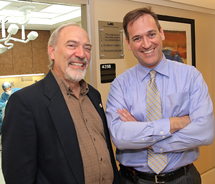Training Dentists to See the Whole Patient
By Doug Gillett
 |
Mark LaGory and Michael McCracken |
Cavities, fillings, plaque buildup, gum disease—dentists in training have a lot to learn about potential problems in the mouth. But at the UAB School of Dentistry, lessons no longer end at the lips. Students now evaluate a host of issues not normally considered part of routine dental care: What other health problems do patients have that might be associated with their dental problems? What aspects of their lifestyles might be contributing factors? And, depending on their socioeconomic status, will they have access to the follow-up care they’ll need down the road?
This new holistic approach can be summed up in three words that are heard frequently around the dental school these days: “the whole patient.” The idea is that patients aren’t just mouths to be worked on but rather whole bodies that are unique members of a diverse society. This is the focus of an innovative new course, “Dentistry and Dental Health: Socio-cultural Factors,” that examines the links between dentistry and daily life.
A Natural Pairing
The class is a collaboration between the School of Dentistry and the UAB Department of Sociology. “Every person who sits in the chair is a sociological study in some way,” says Michael McCracken, D.D.S., Ph.D., associate dean for education and curriculum development at the dental school. “Sociology is as important as biochemistry in the new way of teaching and practicing dentistry.”
McCracken was one of the driving forces behind the recent restructuring of the SOD’s curriculum, which gives all students hands-on clinical opportunities from the first year on. McCracken realized that students need to be prepared for the social realities they’ll encounter in dental clinics—and in their future practices. He says the affiliation with the sociology department was a natural fit because of the department’s doctoral program in medical sociology, the only one of its kind in the country.
McCracken sought out sociology professor and department chair Mark LaGory, Ph.D., who has spent a lengthy career examining how societal conditions and values affect health. “Medical sociology has been around for 50 or 60 years, but we’re just now getting around to understanding as a society that health has social causes as well as physical causes,” LaGory says. “We’ve come up with all these wonderful new treatments, but we haven’t figured into the equation how to get people to take those treatments. And it all goes back to differences in attitudes and understanding of illness in general.”
Life Lessons
To help students understand and consider differing attitudes and values, LaGory and colleague Harry Hamilton, Ph.D., are leading a team of sociologists who are researching and lecturing on various social issues at the dental school. They explore general distinctions such as class, gender, and race, and also delve into specific, thorny issues such as drug addiction, family violence, and homelessness. At the end of each class, students turn in “reflection papers” in which they convey their thoughts about the material presented.
The discussions quickly move beyond the theoretical. Students visit shelters in the Birmingham area to see firsthand what it’s like to be homeless and observe the ways in which homeless people encounter the health-care system.
“Most of our students are young, right out of undergraduate school, and maybe they haven’t interacted with homeless people in a meaningful way,” McCracken says. “They benefit from having exposure to people in these kinds of situations.” Professors can’t teach students to be kinder or more considerate toward their patients, McCracken says, “but you can teach ethics and professionalism, and everybody has a seed of compassion that can be nurtured a little bit.”
In some ways, LaGory adds, teaching students to consider social conditions when diagnosing and treating patients is a matter of drawing out and expanding the same “professional and cognitive skill set” they already use to solve complex and sometimes obscure dental problems.
Doctor, Examine Thyself
Even as they learn more about their patients’ backgrounds and values, students in the course are encouraged to take a deeper look at their own.
To some extent, LaGory points out, dental students—and all those with the wherewithal to pursue doctoral-level education—are more likely to grow up in stable, financially comfortable homes and less likely to be confronted by issues such as domestic violence and addiction. Naturally, then, it’s a challenge when they confront those conditions in their patients, or even people working alongside them in their clinics. “We’re throwing something at them that they might not have had to think about before,” he says. “We’re trying to get them to see the world in a new way and to think about the ‘glasses’ through which they might be viewing their own personal realities.”
For many students, little adjustment is necessary. “They’re not drawn to the health professions just because they know those professions are lucrative,” LaGory says. “They go into these fields to help people—and when we start thinking of patients not just as medical cases but also as social beings, that lights a spark.”